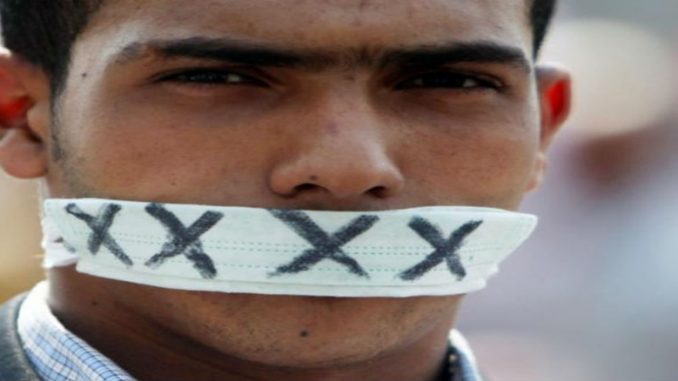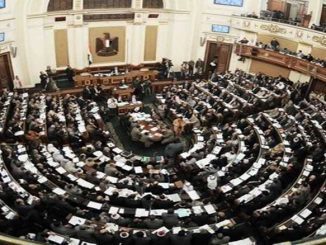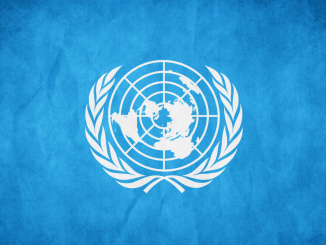
Lawmakers have drafted a new law to punish “political commentators and intellectuals” for defaming historical symbols. Egypt has witnessed a widening crackdown on free expression with fresh arrests and raids, according to Deutsche Welle.
Local media said that the Egyptian’s parliament is set to discuss a law aimed at giving authorities powers to prosecute “political commentators and intellectuals who are heavily involved in defaming the country’s historical and religious symbols.”
According to a legislative proposal by pro-government lawmaker Omar Hamroush, who heads parliament’s religious affairs committee, “A person found guilty could face between three to seven years in prison and up to a 500,000-Egyptian-pound (24,100 euros, $28,300) fine.”
He said,”We should not let some exploit freedom of expression to tarnish the image of these historical figures in the eyes of the people or defame them, because this could leave a very negative impact on young people, leading them to feel disappointment and frustration and lose trust in their country and its leaders.”
The law emerged as a response to talk show hosts challenging the role of historical and religious figures in the making of Egypt’s modern history. But some lawmakers have refused to back the law despite growing support in parliament for the punitive measures.
Independent lawmaker Samir Ghattas said that he was against the draft law.He said,”This draft law reminds me of the Inquisition courts that were dominant in Europe in the medieval era,” said Ghattas.
Since the military coup led by Abdel-Fattah al-Sisi, Egypt has witnessed a widening crackdown on freedom of expression.In 2015 elections, “secular nationalist and populist parties loyal to the former general swept into parliament, which has since served as a rubber-stamp for al-Sisi legislative agenda,” said DW.
The crackdown started against political oppositions and journalists following the ouster of Egypt’s first democratically elected President Mohamed Morsi in 2013. Moreover, during Al-Sisi’s rule, the Egyptian security forces stormed the Press Syndicate building for the first time in history and arrested two journalists.
The Egyptian authorities banned many journalists and TV hosts from appearing on TV, deported or had their shows cancelled. In addition, several reporters and photographers were arrested, detained, and tried over alleged links to Islamists. In 2015, dozens of journalists were physically assaulted during the year by both security agents and civilians.
Authorities continued to employ a variety of tools against journalists and media outlets that strayed from officially sanctioned narratives, including legal prosecution, gag orders, and the outright halting of operations.
Later, the crackdown has transformed into an ever-widening crackdown on arts, literature, music and academia.
Meanwhile, police on Sunday raided a well-known publishing house in downtown Cairo and detained one volunteer, saying they discovered unregistered books on the premises, as reported independent news site Mada Masr.
The Egypt-based Association of Freedom of Thought and Expression said earlier this month in its quarterly report said, “There is still a steady decline in the situation of freedom of expression in Egypt, where various state institutions are involved in restricting freedom of expression and prosecuting individuals who express their views, either through the Internet or as part of their work as journalists, photographers, writers and creative artists.”
Al-Sisi has been intolerant of criticism in the press and repeatedly said that stability and national security were a prerequisite for democracy. According to the Report on Freedom of Speech and Media in 2016 of Freedom House, a U.S.-based NGO that conducts research and advocacy on democracy, political freedom, and human rights, “Abdel Fattah al-Sisi’s efforts to silence dissent and shutter outlets affiliated with the now-banned Muslim Brotherhood have produced a media environment in which most public and private outlets are firmly supportive of the regime.”



